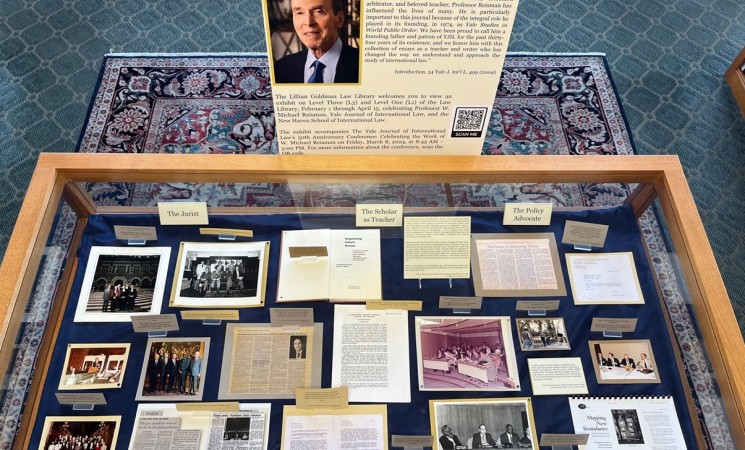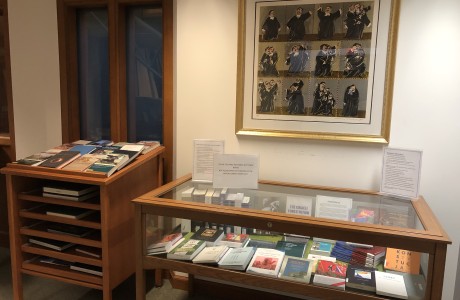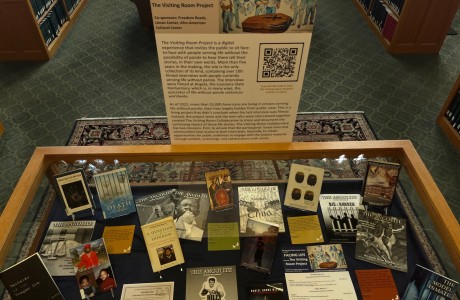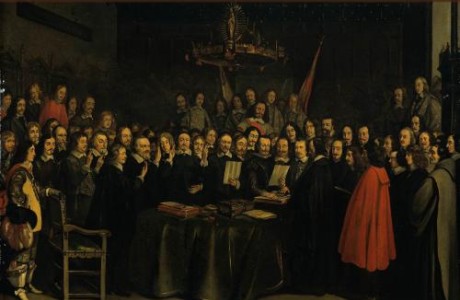Walking Down Memory Lane on the 50th Anniversary of YJIL: An Exhibit in Honor of Professor W. Michael Reisman, Teacher, Jurist, Enduring Patron, and Inspiration

L3 Main Case
Written by Evelyn Ma, Steven Mitchell, and Lucie Olejnikova
Introduction
The Lillian Goldman Law Library invites you to view an exhibit celebrating the work of Professor W. Michael Reisman and the 50th Anniversary of Yale Journal of International Law (YJIL), comprised of three parts. The main display in the L3 Law Library Reading Room highlights Prof. Reisman's work as a counsel and arbitrator, as a prolific author and an inspiring teacher, and as a tireless advocate for policy change.
Accompanying the main display is a timeline that traces the memorable milestones underlying the evolution of the Yale Journal of International Law in its five decades, from its inaugural hand-typed issue as Yale Studies in World Public Order to its present dual format of both print and online. It documents the vibrant intellectual exchanges among law students, teachers, scholars, practitioners, and policymakers.
The third component of the exhibit, located on L1 of the Law Library, illuminates the enduring influence of the New Haven School of International Law from its inception at Yale, in the 1950’s, to the present day, far and wide. It provides the backdrop and context with which both Professor Reisman’s scholarship and that of the Journal is to be appreciated.
W. Michael Reisman
Prof. Reisman has been a counsel of record in many cases, an arbitrator in countless international disputes, and presided over a variety of arbitrations. As the Chairman Arbitrator, Prof. Reisman presided over the OSPAR dispute between Ireland and the United Kingdom “in connection with the commissioning of the mixed oxide nuclear fuel reprocessing plant in the [UK] on the coast of the Irish Sea in 1996.” He also presided over the Bank of International Settlements cases, which issued its Final Award in 2003 in a dispute between the Bank and private shareholders involving the lawfulness of compulsory recall of privately held shares and the adequacy of the compensation provided.
The exhibit includes artifacts from the Eritrea-Ethiopia Boundary Commission Dispute (2000-2007) in which Prof. Reisman, appointed by Eritrea, served as one of the three arbitrators; the Guinea v Guinea Bissau maritime delimitation dispute (1991-1995) (XXV I.L.M. 251 (1986)) in which, along with Prof. Myres McDougal and others, he served as counsel for the Republic of Guinea; and the Qatar v Bahrain maritime delimitation dispute (1991-2001), in which he served as counsel, among others, for the State of Bahrain. On display, in addition to documents, are photographs portraying Prof. Reisman as an advocate.
His voluminous scholarship and teaching accolades aside, the exhibit also spotlights Professor Reisman, as scholar and teacher. The lighter side of the Everyman teacher’s friendship with his students and glimpses of his presence on campus over the years as captured in Yale Daily News are also included. At the 2004 annual meeting of the American Society of International Law, Professor Reisman was awarded the Manley O. Hudson medal, its highest honor for scholarship and achievement in international law.
Prof. Reisman’s global policy advocacy is evident throughout his decades-long career. From his participation in human rights missions (1987-2001), to serving on the Advisory Committee on International Law for the Department of State, being a member of the Foreign Policy Association, and serving as the Vice-Chairman of the Policy Sciences Center, Inc., the exhibit highlights his 1987 work in a Mujahideen Camp in Afghanistan; his Presidency of the Inter-American Commission on Human Rights of the Organization of American States; his contributions to the International Law Commission; and his extensive work as a member of, and the Vice-President and Honorary Vice-President of the American Society of International Law.
Yale Journal of International Law
Primarily a student endeavor, the Yale Journal of International Law (YJIL) was inaugurated in 1974 as Yale Studies in World Public Order under the editorship of then-graduate student Eisuke Suzuki. In the Foreword, Suzuki dedicated the journal to the concept of “World Public Order”. The lead article by the editor, entitled “The New Haven School of International Law: An Invitation to a Policy-Oriented Jurisprudence”, illuminates a world order premised on “reasoned decisions”, which are articulated in Studies in World Public Order (1960) as “decisions achieved through procedures and justified in terms of policy criteria established by community expectation”.
In its five decades, the journal underwent name changes, in 1980 to Yale Journal of World Public Order and in 1984 to its current title, Yale Journal of International Law. It has published a vast array of articles by students and scholars focusing on the many pressing “reasoned decisions” made at the time. The journal has documented, and continues to reflect on, ongoing policy decision discussions among students, scholars, and practitioners of law, as well as policy advocates and makers.
The timeline highlights the journal’s memorable milestones, symposia and colloquia over the five decades. It also spotlights the journal’s complementary online iteration, YJIL Online, a platform embracing the need for contemporaneous discussions.
The New Haven School of International Law
The portion of the exhibit on L1 recounts the history of the school of thought termed the New Haven School of International Law. Initially developed at Yale during the Postwar era, the New Haven School analyzes international law through the lens of public policy. In contrast to the more positivist perspectives on international law which preceded it, The New Haven School prioritizes sociological jurisprudence and aims to recognize and balance both internationally shared values and cultural and national diversity.
Following the advent of legal realism and the collapse of international law in the Interwar period, Yale Law professors Myres S. McDougal and Harold D. Lasswell argued anew for a synthesis of law and policy. More importantly, they incorporated that synthesis into the Yale Law School curriculum, jumpstarting a new framework for approaching international law. By the 1960s, a generation of students had coalesced around this policy-oriented approach and their scholarship, and work began to be referred to, both internally and externally, as the New Haven School.
The exhibit includes important examples of scholarship by McDougal, Lasswell, Reisman, and other scholars who contributed to the formative years of the New Haven School of thought. In addition, it displays the 2007 symposium issue of the Yale Journal of International Law and a 2019 dissertation, each discussing the history and legacy of the New Haven School. Full copies of this scholarship are provided nearby, for browsing and reading.
The exhibit was curated by Evelyn Ma, Steven Mitchell, and Lucie Olejnikova. We thank Professor W. Michael Reisman and Mahnoush H. Arsanjani, Cina Santos, and the team at Manuscripts and Archives at the Yale University Library for their assistance in creating this exhibit. We would also like to thank our colleagues at the Law Library for their support in making this exhibit possible.


